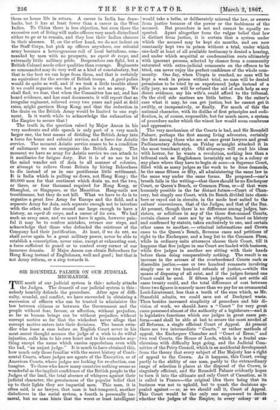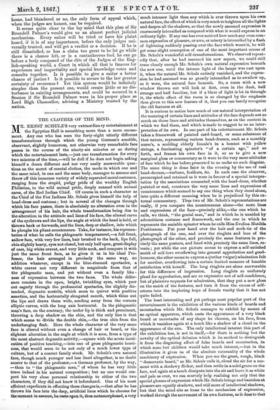SIR ROUND - F . 7;1 - 4 PALMER ON OUR JUDICIAL MECHANISM.
merit of our judicial system is this : nobody attacks the Judges. The demerit of our judicial system is this : nobody heartily defends the procedure. After ages of diffi- culty, scandal, and conflict, we have succeeded in obtaining a succession of officers who can be trusted to administer the law between citizens or between the Government and the people without fear, favour, or affection, without prejudice, so far as human beings can be without prejudice, without corrupt motive so far that the wickedest never allege that corrupt motive enters into their decisions. The basest swin- dler who loses a case before an English Court never in his most secret thought accuses the judge of a wish to do wilful injustice, calls him to his own heart and to his comrades any- thing except the name which carries opprobrium even with the bad, "an unjust judge." It is much to have obtained this, how much only those familiar with the secret history of Conti- nental Courts, where judges are agents of the Executive, or of American Courts, where judges are looking for re-election, can imagine. To those who know many countries nothing seems so wonderful as the implicit confidence of the British people in the Judges of the land, the total absence of whispers against their judicial character, the genuineness of the popular belief that up to their lights they are impartial men. This man, it is often said, is no lawyer, that man -is bad-tempered, another disbelieves in the social system, a fourth is personally im- moral, but no man hints that the worst or least intelligent would take a bribe, or deliberately misread the law, or swerve from justice because of the power or the feebleness of the accused. But procedure is not and cannot be equally re- spected. Apart altogether from the vulgar belief that law is distinct from justice, it is certain that a system under which the accused may be kept six months, and are now constantly kept two in prison without a trial, under which one-half at least of all available testimony is denied a hearing, and under which acquittal or condemnation rests ultimately with ignorant persons, selected by chance from a community saturated with extra-judicial comments on the offence to be tried, can never enjoy the perfect confidence of the whole com- munity. One day, when Utopia is reached, no man will be kept a week in prison without trial, no man will be denied permission to be tried by an experienced judge instead of a silly jury, no man will be refused the aid of such•help as any direct evidence, say his wife's, could afford to the tribunal, On the civil ' side matters are little better. Be the suitor's case what it may, he can get justice, but he cannot get it swiftly, or inexpensively, or finally. For much of this the national character, with its dislike of first principles and codi- fication, is, of course, responsible, but for much more, a system of procedure under which the wisest law would seem cumbrous and oppressive.
The very mechanism of the Courts is bad, and Sir Roundel" Palmer, perhaps the first among living advocates, certainly the first among those who are at once great lawyers and great Parliamentary debaters, on Friday se'nnight attacked it in the most trenchant style. Old attorneys will read his ideas with horror, for he wants a revolution, nothing less than a tribunal such as Englishmen invariably set up in a colony or anyplace where they have to begin de novo—a Supreme Court, filled with as many judges as the work to be done demands, be the same fifteen or fifty, all administering the same law in the same way under the same forms. He proposed—one's breath fails in the writing—that there should be no Exchequer Court, or Queen's Bench, or Common Pleas, or—if that were humanly possible in the far distant future—Court of Chan- cery, but simply one Court, with its Bench divided into cham- bers or rayed out in circuits, in the mode best suited to the suitors' convenience, that of the Judges, and that of the Bar. At present, though there-Ls no difference among judges, bar- risters, or solicitors in any of the three first-named Courts, certain classes of cases are by an etiquette, based on history and confirmed by statute, taken exclusively to one, and certain other cases to another, -- criminal informations and Crown cases to the Queen's Bench, Revenue cases and petitions of right to the Exchequer, and a long list to the-Common Pleas, while in ordinary suits attorneys choose their Court, till it happens that five judges in one Court are loaded with business, while five judges in another are sitting with their hands before them doing comparatively nothing. The result is an increase in the arrears of the overburdened Courts such as discredits justice,—one or two hundred remanets involving simply one or two hundred refusals of justice,—while the means of disposing of all exist, and if the judges formed one Court could be used. If fifteen judges could not settle all cases twenty could, and the total difference of cost between those two figures is scarcely more than we pay for an ornamental Lord-Lieutenant, less than a tenth of the sum which, as Mr. Stansfeld admits, we could save out of Dockyard waste. Then besides increased simplicity of procedure and fair di- vision of work, we should . have a " Court " for very great cases possessed almost of the authority of a legislature—and it is legislative functions which our judges in great cases per- form—and shall be able at last to secure the most needed of all Reforms, a single efficient Court of Appeal. At present there are two intermediate " Courts," or rather methods of appeal, the Exchequer Chamber and " Court of Error," and two real Courts, the House of Lords, which is a feudal ana- chronism with difficulty kept going, and the Judicial Com- mittee of the Privy Council, which is an accidental development from the theory that every subject of Her Majesty has a right of appeal to the Crown. As it happens, this Court, owing partly to the ability of one man, partly to the extraordinary range of selection it places at the disposal of the Crown, is singularly efficient, and Sir Roundell Palmer evidently hopes to turn it into the ultimate and only Court of Cessation, as it is called in France—the original idea there being that its business was not to uphold, but to quash the decisions ap- pealed against — or, as we should call it, Court of Appeal. This Court would be the only one empowered to decide whether the judges of the Empire, in every colony or at
home, had blUndered or no, the only form of appeal which, when the judges are honest, can be required.
It seems quite clear to the lay mind that this plan of Sir Roundell Palmer's would give us an almost perfect judicial mechanism. Every suitor will be tried or have his plaint heard, if it is of any importance, before the only judges uni- versally trusted, and will' get a verdict or a decision. If he is still dissatisfied, or has a claim too great to be let go while there is a chance left, or is a cantankerous fool, he can go before a body composed of the Rite of the Judges of the Eng- lish-speaking world, a Court in which all that is famous for experience and impartiality and special knowledge votes and consults together. Is it possible to give a suitor a better chance of justice I Is it possible to secure to the law greater certainty of reverence ? Yet this system would be infinitely simpler than the present one, would create little or no dis- turbance in existing arrangements, and could be secured in a Session if Sir Roundell Palmer were in his proper place as Lord High Chancellor, advising a Ministry trusted by the nation.































 Previous page
Previous page